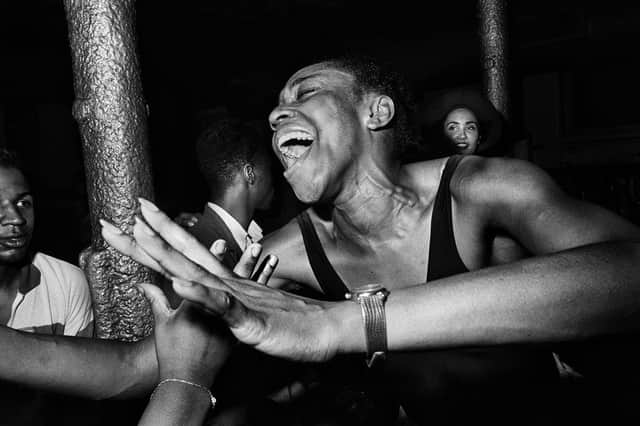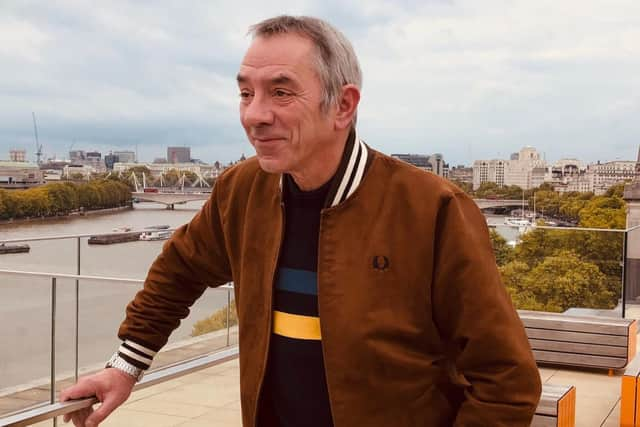Eddie Piller: 'Acid Jazz was the biggest thing in the world in the early 90s'


“There used to be a really good scene there,” he recalls, “and it carried on a lot longer than many of the other Acid Jazz scenes, it was really strong.”
It was in Leeds that he befriended Nick Hodgson, future drummer of Kaiser Chiefs. "They started off as a young Mod band, so they were part of the general scene," he remembers.
Advertisement
Hide AdAdvertisement
Hide AdAcid Jazz resonated so well in Leeds because of its student population, believes Piller, who co-founded Acid Jazz Records and signed several of the movement's leading lights including Jamiroquai, the Brand New Heavies, the James Taylor Quartet, Corduroy and Galliano.
"It wasn't the last youth cult, that was Britpop which came along a couple of years later, but it benefited from a gestation period underground, and it started very small for quite a long time and then blew up in such an enormous way," he says. "It was very popular with students all around the country, universities became a hotbed of jazz, everyone wanted to play again."
Alongside an exhibition commemorating the history of Piller's label and the Acid Jazz club nights he ran at Dingwalls in Camden, there will also be Q&A sessions and gigs, including one by soul singer Omar. "It's not just Acid Jazz the label, it's Acid Jazz the scene, so there are other labels and magazines involved as well," Piller says.
It is “a thrill” for the scene to be remembered now, he says. “Given that Acid Jazz was so big, to be replaced by jungle and Britpop, people have forgotten about it. But it was the biggest thing in the world in 1992, ’93 and ’94, so this is exciting for us.”
Advertisement
Hide AdAdvertisement
Hide AdBack in 1987, Piller and DJ Gilles Peterson had adopted the name Acid Jazz for their new record label as "a joke". "It was a term invented by the DJ Chris Bangs (to describe) the music we were playing in the clubs in London at the time and it just stuck. But as soon as we released a record we realised it wasn't really a joke any more," Pillar says. "We were selling rather more records than a joke, so we decided to stick with it."


Part of the early set-up were club nights at Dingwalls and the Wag Club in London. "Dingwalls was Sunday afternoons," Piller says. "People don't believe this but at the time dancing and drinking alcohol (on Sundays) was illegal, and we're only talking 30 years ago. You could go to church but you couldn't get a pint, so we had to sell raffle tickets for beer, and things like that, it was a mad time.
"But it was good having a club that mixed live bands and records, and Dingwalls and the Wag Club specifically did that. A lot of bands came through there like the Heavies and Galliano and Jamiroquai, all those bands regularly played there and it gave them a chance to develop."
Barely a year after co-founding the label with Piller, Gilles Peterson decamped to Phonogram to launch another imprint, Talkin' Loud. Piller remembers a "massive rivalry" between the two labels. "They had the major money and they were using the major system to promote records, which was fine, and we didn't," he says. "Every time Talkin' Loud did five pages of adverts in a foreign newspaper, we would take a strip and get reviews in. We danced around each other.
Advertisement
Hide AdAdvertisement
Hide Ad"I have to say Talkin' Loud was very good but it didn't go on and Gilles was always fighting the idiots at Phonogram who signed his label but wouldn't let him spend any money. We had Brand New Heavies released in America in the charts and they couldn't release the Young Disciples' album for four years. I feel sorry for the team at Talkin' Loud but we didn't let it get us down."
Piller meanwhile sought to foster a shared ethos within Acid Jazz's roster. "They were all part of a gang," he says. "Eventually majors caught up and you had people like the late Ronnie Jordan, who had a hit with So What on Island, and other labels broke into it. Then, of course, you had massive overselling by people who put Acid Jazz into their name and expected to sell loads of records. Unfortunately for us, they did, so it took the power of the independent label away.
"We weren't allowed to trademark the label because they said that we didn't think it up and that it was a musical genre before us, that was a bit surprising and it allowed the doors to open and for people to just call any old c**p Acid Jazz."
Signing Jamiroquai and licensing their work to Sony, however, proved a masterstroke. The band, fronted by livewire singer Jay Kay, collectively sold more than 10 million copies of their first three albums and helped bankroll Piller's label. "It was incredibly successful, we had them for three albums," he says. "Of course, Sony made (Jay) various offers that he couldn't refuse and in the end they had to buy us out (of his record deal). But people forget the Brand New Heavies' success, they had over 20 UK hits, so they were a lot more involved with Acid Jazz than Jay, I suppose, but all in all, we had a fair crack."
Advertisement
Hide AdAdvertisement
Hide AdIn 1993 Piller bought The Blue Note club in Hoxton, allowing him to put on music seven nights a week. It became home to Metalheadz, the drum and bass club night, which spawned star names such as Goldie, Grooverider and Alex Reece. Talvin Singh also staged his Anokha nights there, championing the sounds of the Asian underground, and Andrew Weatherall and Coldcut took up residence there too. "We decided that every night would be an underground club of a different genre," Pillar says. "The one thing they all had in common was they were all underground at the time. Goldie at the time was very underground, and the club was the most successful in London, it won the Nightclub of the Decade Award in Time Out magazine, which was pretty spectacular.
"As always, the council didn't appreciate it and spent the whole of the time it was open trying to close it, and after five years they were successful, unfortunately... Before the club opened, it was literally seven bomb sites in Hoxton Square, and of course as soon as the club made some action and started getting Hoxton and Shoreditch trendy people wanted to move there and then they didn't want the club. No, if you look at the place, it's awful, Shoreditch and Hoxton, and The Blue Note is closed. It's a big shame."
Since the turn of the Millennium, Acid Jazz has found cult success with its Rare Mod series of 7in singles and Andy Lewis' collaboration with Paul Weller, Are You Trying To Be Lonely? Weller has remained a good friend of the label, Piller says. "He released a record on Acid Jazz under a false name (King Truman) which got me sacked from Polydor where I was a consultant, they didn't like him moonlighting on Acid Jazz," he says.
"The Mod scene has been a constant in my life but it doesn't reflect Acid Jazz totally. While we've done plenty of Mod things over the years, there's also reggae and every kind of music. I'm a big fan of Paul's and I love what he's done with the Stone Foundation as well."
Advertisement
Hide AdAdvertisement
Hide AdLatterly the label's focus has shifted towards box sets and newer signings such as the comedy actor and singer-songwriter Matt Berry and Soul Revivers. Piller believes it's important to keep one on the future and one eye on the past. "Matt Berry, I didn't know who he was," he says. "He came to the office and said 'I've got an album', I said, 'Can I hear it? Does it sound like The Wicker Man?' He said 'Yes, it does', so I said 'All right, we'll release it'. Of course he was quite famous and I didn't know. I think when you have a relationship like that with someone which you approach completely unknowing then they're not worried about you trying to manoeuvre them into making pop records or anything. We've always looked to the future.
"Matt Berry is very important to the label because he makes amazing records, he plays every instrument himself apart from the drums. But we sign new things and old things. We pick up rights to old things. We've just signed X Press 2 for a new album, they had a number one record (Lazy, in 2002), we've just made an album with Dee C Lee, and we've got new things like Nimbus Sextet. We're at maximum capacity."
Among the records that Piller says he's most proud of releasing over the last 35 years are Jamiroquai “because that changed the world, he sold 45 million albums which is pretty good for a kid who was sleeping on sofas when I met him".
He also includes the late US soul, jazz and folk guitarist Terry Callier. "Bringing Terry over was an incredible experience," Piller says. "He lied, I phoned his house every day for seven weeks and he said he didn't live there. In the end he came on the phone and said, 'My daughter said you're going to have to take this call or he'll phone you for the rest of your life. He had retired from music after some bad experiences eight years before and I persuaded him to come back and he had a second career and won a United Nations' Time For Peace award."
Advertisement
Hide AdAdvertisement
Hide AdHe adds the Brand New Heavies whose debut "blue album" was "incredible", he says.
Piller’s book on his early life, Clean Living Under Difficult Circumstances, will be released to coincide with the exhibition. “It stops when I meet Gilles Peterson,” he says. “It's the story of my early life which is basically the memoirs of a Mod.”
Acid Jazz & Other Illicit Grooves runs at Sunny Bank Mills, Town Street, Farsley, Leeds from April 5-10. Omar plays at The Old Woollen on April 7. Eddie Piller will be doing a Q&A with Rick Buckler at The Old Woollen on June 13.
